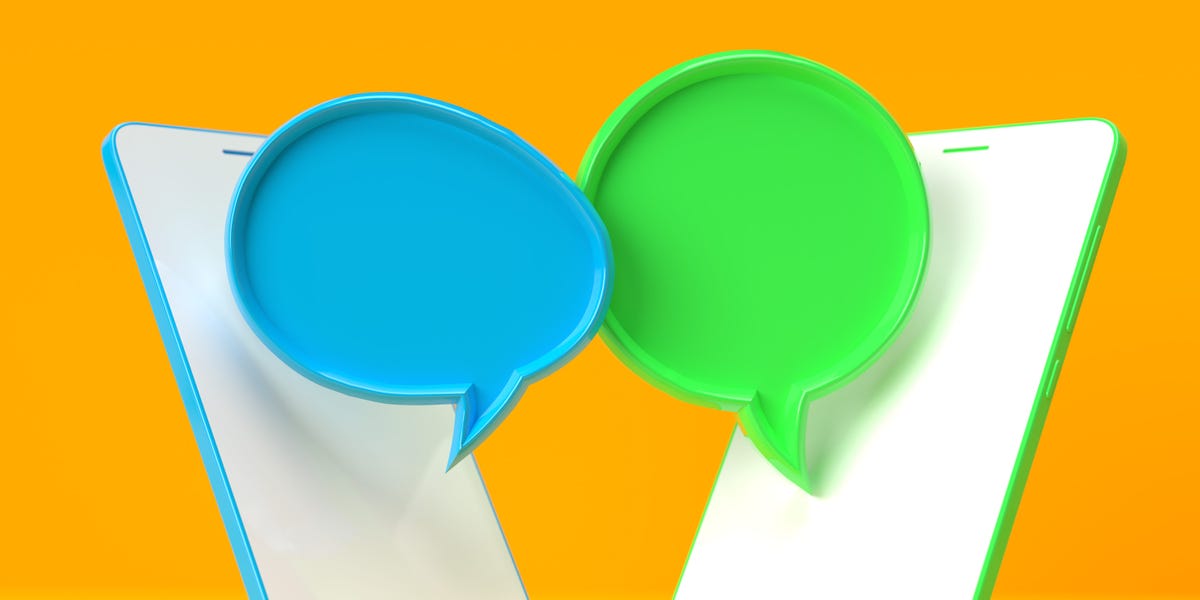Jump to
The battle of the green and blue bubbles rages on, but don’t expect it to be resolved anytime soon.
Google, which owns the Android operating system, wants Apple to change how it converts texts from Android sent to iPhones into green-colored messages — not into Apple’s signature blue iMessage blurbs.
Google went so far as to call the current texting experience between Android and iPhones “broken.”
But here’s the thing: Apple doesn’t have a strong incentive to accommodate green bubblers — whether that’s either integrating iMessage into Androids or adopting a modern-day messaging protocol that would more seamlessly transfer communication from Androids to iPhones.
Apple’s iMessage, the platform that iPhone and Mac can use to message each other, is a fantastic way to keep iPhone users locked into the Apple ecosystem — company leadership has even said as much.
Legal documents revealed in 2021 that the company was 1) able to create, at one point, an Android version of iMessage that was also compatible with Apple’s systems but 2) didn’t want to because it was afraid of users ditching their iPhones for Google’s product instead.
“The#1 most difficult [reason] to leave the Apple universe app is iMessage … iMessage amounts to serious lock-in,” said a former Apple employee in 2016.
Later in the exchange, Apple executive Phil Schiller replied. “Moving iMessage to Android will hurt us more than help us,” he said.
But Google has also said that it doesn’t want to develop an Android-specific version of iMessage — all it wants is for Apple to adopt something called RCS.
Google has long been publicly pressuring Apple to adopt what’s called Rich Communication Standard, or RCS. It’s not something that Google developed — it’s an open communication standard that industry partners created in 2007.
RCS is supposed to be the new-and-improved version of SMS. Where that 1980s-era standard was designed more so for text-only messages, RCS accommodates texts and all sorts of media, like photos, videos, and gifs.
Another qualm that users have with videos and photos sent from Android to iPhones is that they’re usually compressed and appear blurry. Apple adopting RCS, Google says, would fix that.
Samsung has been supporting RCS between its messaging app and Google’s optional Chat since 2018, though it doesn’t always work very well. And if Android users aren’t using Samsung Messages or Google Messages, texts show up in SMS form.
There’s also more of a security risk texting via SMS, too, instead of within the confines of an ecosystem like iMessage, which is end-to-end encrypted proprietary software and one of the market’s most secure messaging systems.
And a caveat to RCS is that it’s an open standard, meaning it doesn’t come with end-to-end encryption by default. Apple could cite that issue as a security risk in a debate against adopting RCS.
However, end-to-end encryption could be added on — Google said it was doing as much with its RCS group chats in May.
Google made it crystal clear this week that it’s not willing to just let the issue go. It created a webpage devoted to calling for Apple to “fix green and blue bubbles, and texting for everyone.”
It openly stressed not only the bubble issue, but also how videos are blurred and compressed when sent between the different smartphones, the lack of read receipts with cross-device messaging, and how you need WiFi to text between them.
Then back in June, Google snarkily made and tweeted an “unofficial lyric explainer video” praising rapper Drake’s song “Texts Go Green,” which is about miscommunication with a partner. Google took it a step further and interpreted it as a protest against iPhone turning Android users’ texts green.
Even Google leadership has publicly addressed this in 2022. The Wall Street Journal published a report in January entitled “Why Apple’s iMessage is Winning: Teens Dread the Green Text Bubble” that detailed young users’ opposition to Androids to avoid social alienation and bullying.
Hiroshi Lockheimer, a senior vice president at Google, reshared the article at the time.
“Apple’s iMessage lock-in is a documented strategy,” he tweeted. “Using peer pressure and bullying as a way to sell products is disingenuous for a company that has humanity and equity as a core part of its marketing. The standards exist today to fix this.”
So while Apple would likely argue there are a host of potential downsides to adopting RCS and appeasing Android users, one of those reasons towers over the others: Keeping blue text bubbles keeps people using Apple products, and that’s good for business.
Read next

